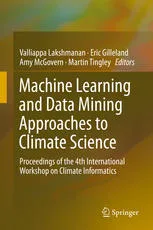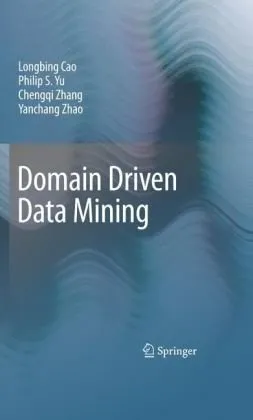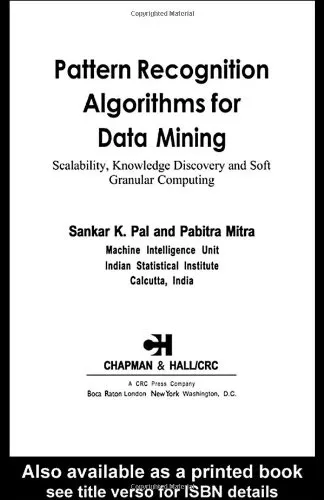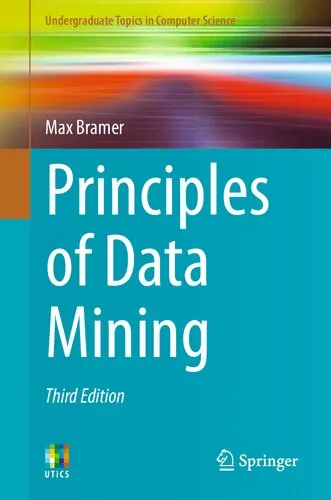Machine Learning and Data Mining Approaches to Climate Science: Proceedings of the 4th International Workshop on Climate Informatics
4.0
Reviews from our users

You Can Ask your questions from this book's AI after Login
Each download or ask from book AI costs 2 points. To earn more free points, please visit the Points Guide Page and complete some valuable actions.Related Refrences:
Introduction to "Machine Learning and Data Mining Approaches to Climate Science"
Climate science is an immensely complex and data-rich field that benefits tremendously from advancements in machine learning and data mining techniques. In "Machine Learning and Data Mining Approaches to Climate Science: Proceedings of the 4th International Workshop on Climate Informatics," this interplay between cutting-edge computational methods and climate studies takes center stage. This book documents the significant ideas, methodologies, and results shared during the 4th International Workshop on Climate Informatics, a space where researchers and practitioners collectively explore novel computational tools to solve pressing challenges in climate science.
From understanding the dynamics of climate systems to predicting extreme weather events, machine learning has emerged as a transformative tool in climate-related research. As this book demonstrates, integrating machine learning frameworks with climate science datasets not only accelerates scientific discovery but also holds the potential for meaningful policy impact. Compiled by Valliappa Lakshmanan, Eric Gilleland, Amy McGovern, and Martin Tingley, the book brings together interdisciplinary perspectives and delves deep into state-of-the-art approaches at the intersection of machine learning, data mining, and climate informatics.
This introduction sets the stage for a detailed exploration of the book's content, key takeaways, and its enduring contributions to the fields of computer science and climate research. By the end of this discussion, readers will gain insightful perspectives on how artificial intelligence can revolutionize our understanding and response to climate change, a looming existential challenge.
Summary of the Book
The book serves as a curated repository of research on applying advanced computational techniques to climate science. It features contributions from a diverse array of experts, covering a wide spectrum of topics such as predictive modeling, anomaly detection, visualization strategies, and hybrid approaches combining physical modeling with machine learning.
The early chapters emphasize fundamental machine learning concepts tailored for climate informatics, offering insights into state-space models, support vector machines, neural networks, and decision trees. The discussions then transition into domain-specific challenges, including the processing of massive climate datasets, the development of scalable algorithms, and strategies for reducing predictive uncertainty. A recurring theme is the importance of fostering collaborative research efforts across computing, statistics, and geosciences.
Later sections introduce novel applications, from early-warning systems for extreme weather events to the use of reinforcement learning in climate process optimization. The collected works not only highlight innovative methodologies but also propose avenues for future development, bridging the gap between theoretical research and practical implementations. Case studies, real-world datasets, and reproducibility discussions serve to strengthen these proceedings' role as an invaluable resource for both researchers and practitioners.
Key Takeaways
- Machine learning techniques, such as deep learning and unsupervised clustering, play a pivotal role in modern climate science by enabling faster and more precise analysis of complex phenomena.
- Interdisciplinary collaboration is essential to effectively address climate challenges, requiring input from data scientists, climate specialists, statisticians, and policymakers alike.
- Open-access datasets and computational resources are democratizing climate research, fostering collective innovation on a global scale.
- Ethical considerations and transparent methodologies remain crucial as machine learning increasingly influences critical climate policy decisions.
- The fusion of traditional physical models with data-driven approaches enhances the interpretability and reliability of climate predictions.
Famous Quotes from the Book
"Climate informatics is not just a research discipline; it is a moral imperative in today's age of climate uncertainty."
"The collaboration between machine learning and climate science is one of the brightest examples of interdisciplinary success in modern research."
Why This Book Matters
Climate change remains one of the most urgent challenges of our time, and solving it requires innovative tools and a robust understanding of data. "Machine Learning and Data Mining Approaches to Climate Science" plays a pivotal role in this endeavor by illustrating how cutting-edge computational techniques can enhance our ability to monitor, understand, and respond to climate phenomena.
The book is not only a scientific resource but also a call to action for researchers, industry professionals, and governments to embrace machine learning as a vital component of climate action plans. Its emphasis on interdisciplinary collaboration and reproducibility underscores its potential to inspire meaningful advancements in the fight against global climate change. For any researcher, student, or policymaker interested in climate informatics, this book represents an essential guide to a rapidly advancing field that holds the keys to understanding the planet's future.
Free Direct Download
You Can Download this book after Login
Accessing books through legal platforms and public libraries not only supports the rights of authors and publishers but also contributes to the sustainability of reading culture. Before downloading, please take a moment to consider these options.
Find this book on other platforms:
WorldCat helps you find books in libraries worldwide.
See ratings, reviews, and discussions on Goodreads.
Find and buy rare or used books on AbeBooks.
1179
بازدید4.0
امتیاز0
نظر98%
رضایتReviews:
4.0
Based on 0 users review
Questions & Answers
Ask questions about this book or help others by answering
No questions yet. Be the first to ask!





![Mining of Massive Datasets [Team-IRA]](https://s3.refhub.ir/images/thumb/Mining_of_Massive_Datasets__Team-IRA_19920.webp)








